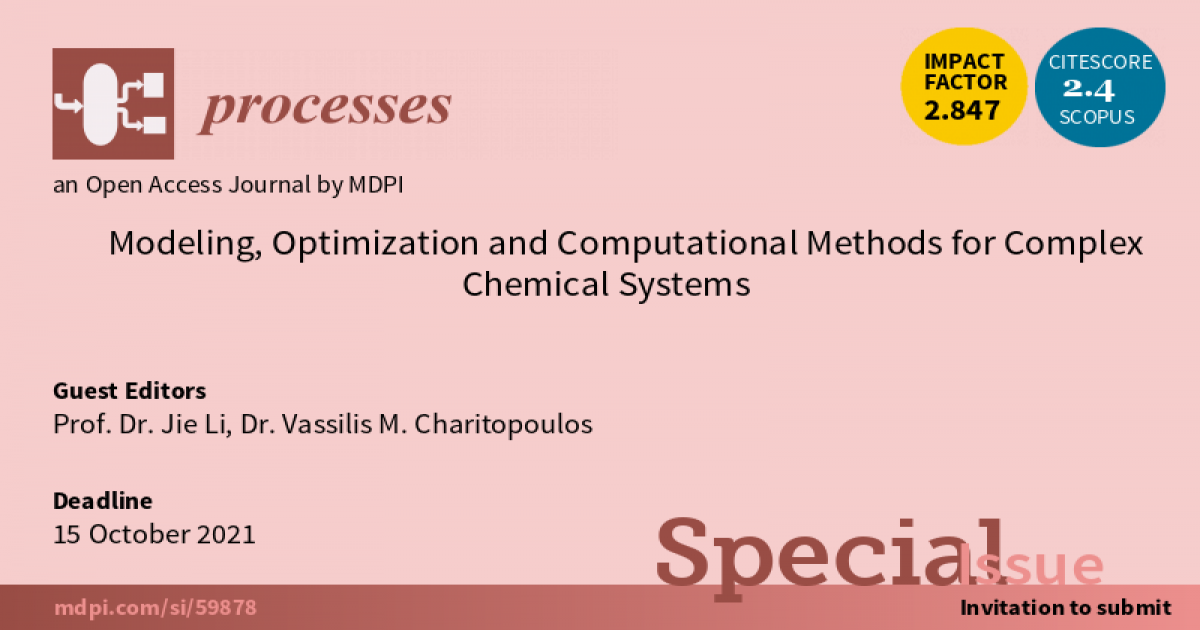Modeling, Optimization and Computational Methods for Complex Chemical Systems
A special issue of Processes (ISSN 2227-9717). This special issue belongs to the section "Chemical Processes and Systems".
Deadline for manuscript submissions: closed (15 October 2021) | Viewed by 5140

Special Issue Editors
Interests: multiscale modelling and global optimisation for large-scale complex systems; process synthesis, design, analysis, integration and intensification for sustainable production of fuels and chemicals; Industry 4.0: advanced planning and smart scheduling in manufacturing; robust optimisation
Interests: enterprise-wide optimisation; data-driven dynamic optimisation, cyber-manufacturing systems; multiparametric programming; model-based control algorithms; process planning, scheduling; game theory; decision-making under uncertainty; industrial demand side response strategies; industrial decarbonisation
Special Issue Information
Dear Colleagues,
Complex chemical systems are often highly interconnected, dynamic and multidimensional. To better design, understand, analyse, predict and optimise behaviours of complex chemical systems, advanced mathematical models, optimisation methods and computational tools are substantially desired. Recent advances in big data analytics, new machine learning technologies and supercomputing powers are bringing about step changes in mathematical modelling and optimisation of complex chemical systems. For example, new methodologies can be proposed to build multiscale models, data-driven models or hybrid mechanism/data-driven models for process–product design, synthesis and integration using new machine learning technologies. Data-driven optimisation algorithms can be developed to solve more difficult optimisation problems of complex chemical systems. Artificial-intelligence-powered decision-making tools can be implemented for chemical production planning and scheduling.
This Special Issue on “Modelling, Optimisation and Computational Methods for Complex Chemical Systems” aims to present latest novel advances in the development and application of advanced mathematical modelling methodologies, optimisation algorithms and computational methods for complex chemcial systems and to stimulate further research in this important area. Topics include but are not limited to:
- New methodologies for multiscale modelling, data-driven modelling and hybrid mechanism/data-driven modelling;
- Advanced optimisation theory, methods, algorithms and tools;
- Process-product synthesis, design, integration and intensification using state-of-the-art modelling and optimisation methods;
- Process control and operations using cutting-edge modelling techniques and optimisation algorithms;
- Industrially revelant applications of state-of-the-art models and computational methods.
Prof. Dr. Jie Li
Dr. Vassilis M. Charitopoulos
Guest Editors
Manuscript Submission Information
Manuscripts should be submitted online at www.mdpi.com by registering and logging in to this website. Once you are registered, click here to go to the submission form. Manuscripts can be submitted until the deadline. All submissions that pass pre-check are peer-reviewed. Accepted papers will be published continuously in the journal (as soon as accepted) and will be listed together on the special issue website. Research articles, review articles as well as short communications are invited. For planned papers, a title and short abstract (about 100 words) can be sent to the Editorial Office for announcement on this website.
Submitted manuscripts should not have been published previously, nor be under consideration for publication elsewhere (except conference proceedings papers). All manuscripts are thoroughly refereed through a single-blind peer-review process. A guide for authors and other relevant information for submission of manuscripts is available on the Instructions for Authors page. Processes is an international peer-reviewed open access monthly journal published by MDPI.
Please visit the Instructions for Authors page before submitting a manuscript. The Article Processing Charge (APC) for publication in this open access journal is 2400 CHF (Swiss Francs). Submitted papers should be well formatted and use good English. Authors may use MDPI's English editing service prior to publication or during author revisions.
Keywords
- complex chemical system
- mathematical modelling
- optimisation
- multiscale modelling
- computational methods
- machine learning
- data-driven
- artificial intelligence






